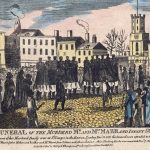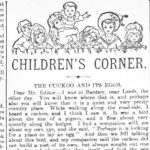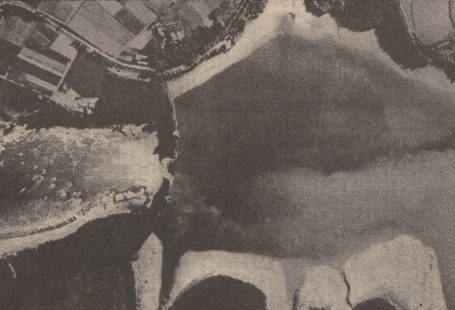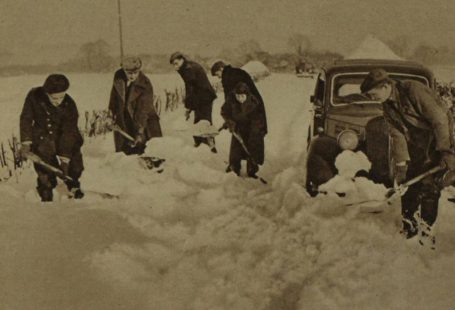This week we have been busy adding another 88,278 brand new pages to The Archive, and we are delighted to welcome two very special brand new titles to our collection.
So read on to discover more about these two titles – one a Swansea-based daily newspaper, and the other an early radical crime-focused title from the 1830s, compete with engravings.
Register now and explore the Archive
The first of our duo of new titles this week is Cleave’s Weekly Police Gazette, which was founded by printer, publisher and editor John Cleave in 1834. Printed out of Shoe Lane, off London’s Fleet Street, Cleave’s Weekly Police Gazette was an instant success, with a circulation of 40,000 and a weekly profit of £30.
Covering the latest crimes of the day, this newspaper was comprised of four pages and featured engravings, sketches and advertisements. But this particular publication is all the more fascinating because it also agitated for radical political reform – Chartism, factory reform, and the repeal of the newspaper tax being a few of the causes that it threw itself behind.
Cleave’s Weekly Police Gazette | 30 June 1836
Indeed, John Cleave was known as ‘one of the heroes of the unstamped working-class press,’ as he refused to pay newspaper tax on his title. In distributing his unstamped newspapers, Cleave often came up with ingenious methods, including smuggling them out of his shop in coffins.
But Cleave soon found himself imprisoned for his refusal to pay tax on his new publication. However, his fines were paid by the Association of Working Men to Procure a Cheap and Honest Press (later named the Working Man’s Association). But Cleave’s Weekly Police Gazette was not to last long, as in 1836 it merged with Henry Hethrington’s London Dispatch. Cleave himself then went on to establish Cleave’s London Satirist and Gazette of Variety.
Our second brand new title of the week is the Cambria Daily Leader, which was established in Swansea in 1861. Labelling itself ‘The Pioneer of the Welsh Press,’ the Cambria Daily Leader was a Liberal publication and cost one halfpenny. With a circulation of 10,000, it was ‘The only daily paper printed in the Borough of Swansea,’ and promised to be both ‘Progressive and Comprehensive.’
Cambria Daily Leader | 8 August 1885
Circulating in south and west Wales, it ‘espoused a broadly Liberal stance,’ containing local, general and foreign news. Within its pages you could find the ‘Latest News,’ and also news from Welsh towns and cities like Carmarthen, Cardigan, Flint, Bridgend and Cardiff. It also had a focus on international news, for example featuring sections on ‘The Civil War in America.’
Other sections in the Cambria Daily Leader included ‘University Intelligence, ‘Sporting Intelligence,’ ‘Law Intelligence’ and ‘Shipping Intelligence.’
The Cambria Daily Leader was later merged with the South Wales Daily Post, and then with the South Wales Evening Post in 1932.
Taxes on Knowledge and ‘The War of the Unstamped’
In 1712, tax was put on all publications and pamphlets at a rate of one halfpenny, but by 1815, under the administration of Lord Liverpool, this had risen to 4d. Liverpool’s government actively sought to discourage certain sections of the press, and at a time of economic instability and unrest, this fuelled the rise of the so-called unstamped press.
The taxing of newspapers and other publications came to be seen as a ‘tax on knowledge,’ and so the unstamped newspapers of the day were radical repositories mostly aimed at the working classes, advocating for their rights and education.
Cleave’s Weekly Police Gazette | 20 August 1836
Cleave’s Weekly Police Gazette was just one of these unstamped newspapers, running between 1834 and 1836, the latter year being the height of ‘The War of the Unstamped,’ as it became known. At this time, 800 people were imprisoned for their role in the distribution and publication of the unstamped press, with Cleave’s Weekly Police Gazette chronicling such arrests, and the resistance to them.
For example, Cleave’s Weekly Police Gazette tells on 26 December 1835 of the charging of Noah Flood and Frederick Thomas for ‘carrying about for sale unstamped newspapers.’ Thomas had been seen ‘near a Shoreditch church,’ putting a newspaper under the door. He was stopped, and found with a copy of Cleave’s Gazette and five Twopenny Dispatches.
Cleave’s Weekly Police Gazette | 26 December 1835
Thomas protested, and said that ‘he only sold the papers to those who could not afford to pay for the stamped papers.’ Despite being a ‘clerk in a respectable house,’ Thomas was ‘liable to three months’ imprisonment.’
The tone of the unstamped press was clear, this was nothing less than a war. This is evidenced by a letter signed by one J. Kelsey of Newcastle-under-Lyme, published on 2 April 1836 in Cleave’s Weekly Police Gazette:
Seizure of the Unstamped at Newcastle – Friends and Countrymen – The enemy has made his appearance amongst us. You are aware than an agent of the Stamp Office, named Greenstreet, has, at Newcastle, seized upon the papers intended for your use; and you are well aware, that similar seizures have taken place all over the country.
Elsewhere, those associated with the unstamped press were mobilising like an army, planning their strategy in the face of attack. This advertisement appeared in the pages of Cleave’s Weekly Police Gazette on 2 April 1836:
To the Proprietors, Publishers and Vendors of the Unstamped – A Public Meeting will be held on Easter Tuesday Evening, at Mr. Carlile’s Lecture Room, Ship-yard, Temple-bar. Information will be brought forward, which will concern the whole of the above branches. It is therefore urgently necessary that nothing but sickness or absence prevent the attendance of every person connected with the Unstamped, except Spies and Informers. Commence at 6 o’Clock precisely. Admission free.
Cleave’s Weekly Police Gazette | 2 April 1836
The urgency of tone here is clear; as is the suspicion of the so-called enemy, and their spies and informers.
And admiration of the unstamped press and their mission of education – Cleave’s Weekly Police Gazette running under the headings of ‘Truth’ and ‘Justice,’ as well as ‘Knowledge is Power’ – was strongly felt in radical circles.
One Mr. Addaway, speaking at a meeting of the Chatham Radical Association, tells of how ‘the unstamped press has made us wiser,’ and how ‘All the unstamped have honestly and fearlessly advocated popular rights.’ In contrast, he described how the ‘stamped-press productions, in the main, are a scandal and a foul disgrace to the nation.’
Cleave’s Weekly Police Journal | 23 April 1836
The agitating of the unstamped press bore fruits – in 1836 the stamp duty was cut to 1d, but it wasn’t until 1855 that is was abolished completely. And so let us not forget the role that such publications as Cleave’s Weekly Police Gazette played in bringing about a freer and less unshackled press, devoted to the interests of the working man.
New Titles
Title | Years Added |
| Cambria Daily Leader | 1861-1870, 1882-1895, 1899-1905 |
| Cleave’s Weekly Police Gazette | 1835-1836 |
You can keep up to date with all the latest additions by visiting the recently added page. You can even look ahead to see what we’re going to add tomorrow.












